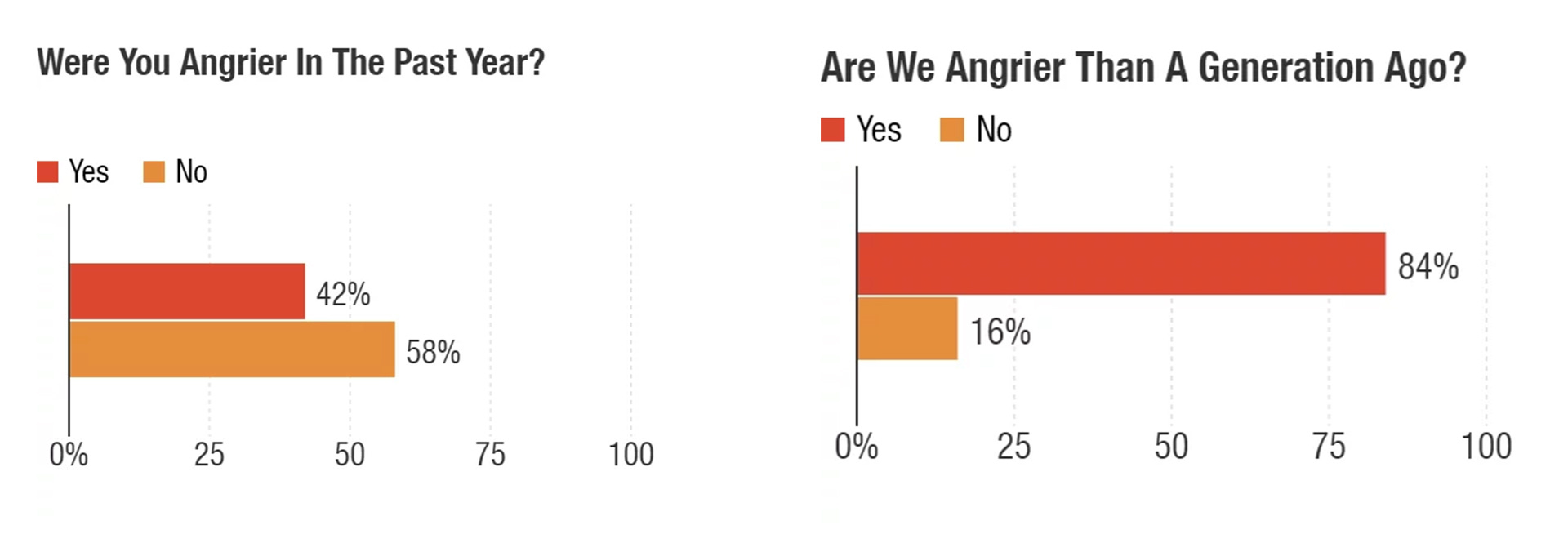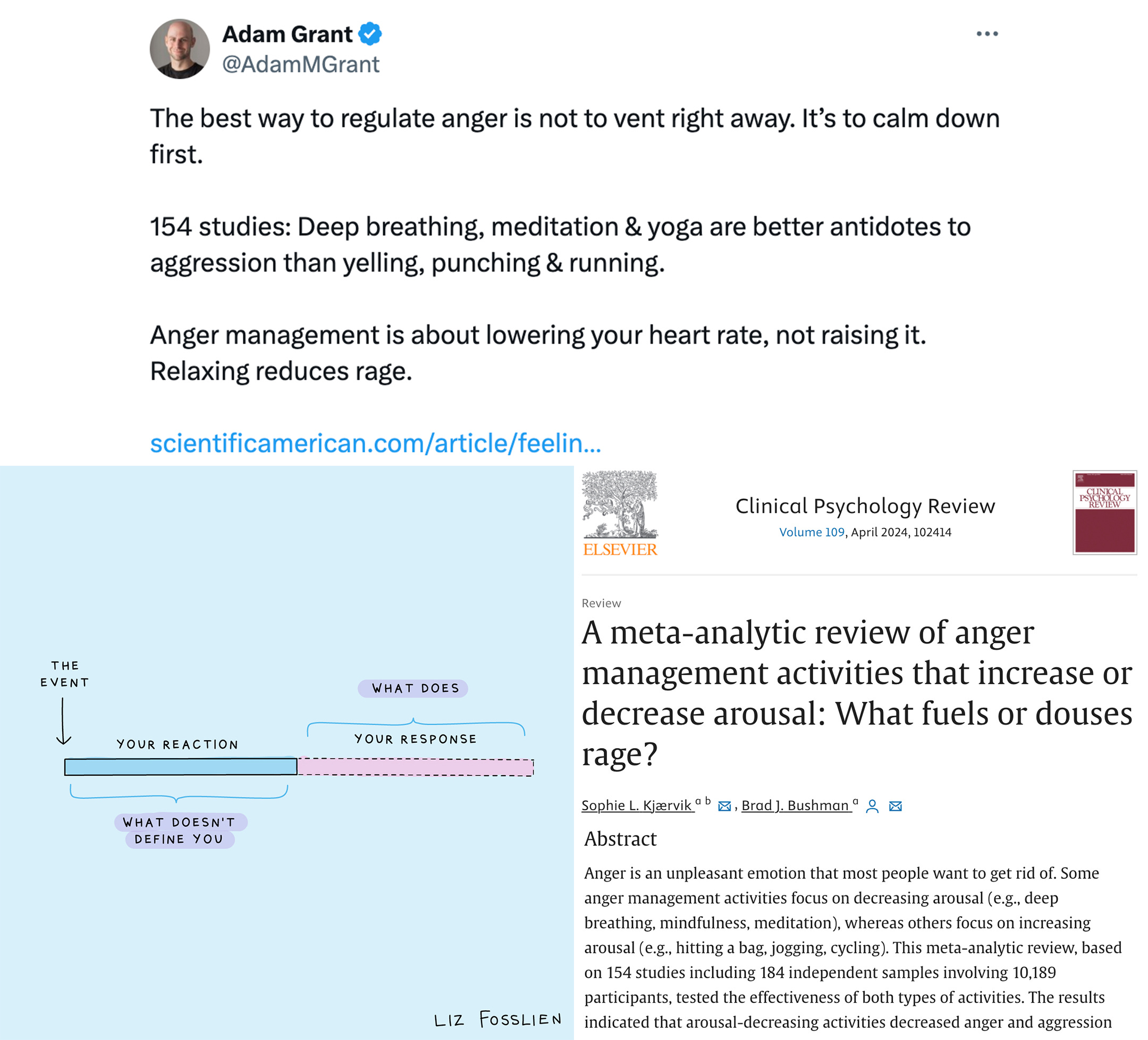According to the old adage, if you don’t have anything nice to say, don’t say it at all. (As an aside, growing up, my parents had a needlepoint pillow that occupied prime real estate on the living room sofa that read, “If you don’t have anything nice to say, come and sit right here by me” but that’s a story for another day.) The notion of keeping nasty comments to oneself seems almost antiquated given the venom constantly unleashed online and in real life. When it comes to outrage, “better out than in” is the prevailing mindset.
Expressing outrage has become a national pastime. A poll found that 84% of people think people are angrier today compared with a generation ago, and 42% said they themselves were angrier than they used to be.

In a recent Substack, I wrote about Abraham Lincoln’s famous strategy for managing anger. Whenever his feathers were ruffled, he would write a “hot letter” to the person who had upset him but never send it. A study published in Scientific Reports in Nature just last week by researchers at Nagoya University confirms that Honest Abe was onto something.
Write it Down, Toss it Away
Participants in the study were asked to write brief opinions about a social issue, such as whether smoking in public should be banned. They were then told that their writing would be evaluated by a doctoral student. In reality, there were no doctoral students. Regardless of what participants wrote, they received low scores on all measures including intelligence, interest, friendliness, logic, and rationality. To add insult to injury, included in the feedback were obnoxious comments such as “I cannot believe an educated person would think like this. I hope this person learns something while at the university.”
After receiving the low scores and harsh comments, participants were asked to write their feelings down on a piece of paper. As expected, all participants were incensed. Half the group was told to keep their written response on their desk while the other half was asked to crumple the paper into a ball and toss it into the trash. Both groups were then asked to rate their anger. Those who threw out the piece of paper reported no longer feeling angry whereas those who held onto it also held onto their anger. A second similar experiment found that shredding the note with the angry thoughts also neutralized it.
The findings suggest that the simple act of physically discarding one’s negative sentiments is a powerful anger management tool.
“We expected that our method would suppress anger to some extent,” lead researcher Nobuyuki Kawai said. “However, we were amazed that anger was eliminated almost entirely.”
Thankfully, for the sake of history, Abraham Lincoln did not fully dispose of his hot letters. Burying them in a file in a desk drawer was his way of discarding his fury and moving on. While his method may not have been quite as effective as crumpling the letters into a ball and tossing them into the garbage or shredding them, Lincoln chose to keep his fury to himself.
Choose Calm
As this research shows, we are not at the mercy of our emotions. “Big feelings” as people like to call intense bursts of emotion these days, need not dictate every action unless, of course, you are a toddler. While imperfect, we have choices. We have agency. We have tools. As Dr. Aliza Pressman, my friend and best selling author of The Five Principles of Parenting, likes to say, “All feelings are welcome, all behaviors are not!”
While there is no doubt that social contagion can amplify feelings such as anger, a Stanford study found that people’s motivations are a driving force behind how much they allow others to influence them. According to their research, when people want to stay calm, they remain relatively unfazed by angry people but when they want to feel angry, then they soak up other people’s anger.
“The degree to which people said they were motivated to feel or not feel certain emotions predicted how much they would be influenced when they were exposed to emotions from other group members,” said Amit Goldenberg, the lead author on the study. Put simply, our emotions aren’t passive or automatic. We have a say in how we feel and subsequently behave. As Eleanor Roosevelt famously said, “No one can make you feel inferior without your consent.” We are participants in, not witnesses to, our emotional lives.
Breathe, Don’t Vent
Conventional wisdom holds that blowing off steam is one of the best ways to reduce anger. This is a myth. Venting, punching a bag, or screaming into a pillow dials up physiological arousal which amplifies anger. Similarly, going for a run, cycling and boxing are good exercises but also dial up physical sensations associated with rage. A review of 154 studies found that activities that dial down physiological arousal such as deep breathing, yoga and meditation are far better antidotes for anger.

Anger is natural. How we respond to it is what matters. The parable of the Two Wolves comes to mind:
The grandmother tells her granddaughter, “Inside of all of us is a battle between two wolves. One is the dark wolf. It is anger, jealousy, regret, greed, arrogance, and resentment.
The other wolf is good. It is love, peace, hope, kindness, serenity, compassion, faith and empathy.
The granddaughter thinks about this for a minute and then asks her grandmother, “Which wolf wins?”
And the grandmother replies, “The one you feed.”
What I love about this story is how it captures the importance of our actions, agency, and attention. Every single day we have opportunities to feed the good wolf or indulge the bad one. It’s up to us which one we choose to nourish.
I wish you all the best,
Dr. Samantha Boardman






